Invasion of Astro-Monster (1965)
Directed by: Ishirô Honda
Written by: Shinichi Sekizawa
Starring: Akira Kubo, Akira Takarada, Kumi Mizuno, Nick Adams
HCF REWIND NO.122. INVASION OF ASTRO-MONSTER AKA MONSTER ZERO, KAIJU DAISENSO, THE GREAT MONSTER WAR [Japan 1965]
AVAILABLE ON DVD
RUNNING TIME: 96 min
FEATURED MONSTERS: GODZILLA, RODAN, KING GHIDORAH
REVIEWED BY: Dr Lenera, Official HCF Critic
A spacecraft, crewed by astronauts Fuji and Glenn, approaches Jupiter’s orbit to explore the newly discovered Planet X. There, the two encounter the Xians, human-like aliens who live underground because King Ghidorah, who soon appears, is terrorising them. The Controller asks for Earth’s help in capturing Godzilla and Rodan, known to the Xians as Monster 01 and Monster 02, in return for which Planet X will gift humanity with a wonder drug that can cure all cancer. Meanwhile, Fuji’s sister’s boyfriend, Tetsuo, has invented a personal alarm which no one is interested in buying until a Miss Namikawa, who is going out with Glenn, shows interest but keeps putting him off. Then it is revealed that the Xians are already on Earth, and Glenn and Fuji get very suspicious….
I wasn’t much of a fan of Invasion Of Astro-Monster for many years. Though I had seen three Godzilla films already, my first real immersion in the series came when Channel 4 showed seven of the films around the mid-80’s. Invasion Of Astro-Monster was the one I liked least, mainly due to its relatively small amount of monster footage and talky stuff involving the human [and alien] characters, and it also didn’t help that it came after Destroy All Monsters [Channel 4 didn’t show them in the correct order] and elements of its story was the same. The movie has grown on me though. It could certainly move a little faster but is full of fun details and is quite well plotted, though the story doesn’t hold up to scrutiny whatsoever and the monster action is so separate from the human/alien action that, even more than Ghidorah The Three-Headed Monster, you almost don’t need the monsters in the film. Taken as a Godzilla film, Invasion Of Astro-Monster is mediocre, but taken as a science-fiction spectacle with a guest appearance by the King of the Monsters, there is lots of entertainment to be had.
Like Frankenstein Conquers The World the Toho film that proceeded it, and its semi-sequel The War Of The Gargantuas, Invasion Of Astro-Monster was a co-production with UPA [United Productions Of America]. UPA’s boss Henry G. Saperstein, who takes credit for persuading Toho to make Godzilla into more of a good guy, provided 50% of the funding for these three films and also an American star, in this case Nick Adams who had also been in Frankenstein Conquers The World. Scriptwriter Shinichi Sekizawa, as I said in my review for that film, seemed to partially follow on from Ghidorah The Three-Headed Monster in his screenplay. This was the first Toho film since Varan The Unbelievable to employ stock footage, aside from the odd shot of military mobilisation, though not to the degree of some later films. The film was another commercial success though for some reason it wasn’t released in the US until 1970, in a double bill with The War Of The Gargantuas, and released through Maron Films. Sadly by then Adams had killed himself from overdosing on a prescription drug. It is claimed he did this because of the end of his affair with co-star Kumi Mizuno, a relationship which had caused him to divorce his wife, though some actually say he was murdered.
Once again Sekizawa introduces his usual situation of a man, his girlfriend and his girlfriend’s disapproving brother, and re-uses his King Kong Vs Godzilla idea of a man’s seemingly-silly invention eventually becoming Really Useful. He makes things a bit more complex with Glenn’s relationship with Miss Namikawa, the mysterious toy shop representative who is actually an alien. If you listen carefully, their relationship actually includes sex, though this strange love story would have worked better if we had seen Glenn and Namikawa first meet. The plot really takes its time to develop, with even the scenes on Planet X very slow-moving. Everything there seems to take ages, though the film does build up a decent feeling of intrigue and mystery. The handling is quite serious, which jars a little with the goofy handling of the monster scenes, right from Godzilla and Rodan’s first appearance where they are taken in huge bubbles to Planet X. This is soon followed by one of the all-time classic silly Godzilla moments, when, after besting Ghidorah with Rodan, he does a daft victory dance, in Japan called the shie and taken from a Japanese comic book Ahso Matsu-kun. Director Ishiro Honda didn’t like the route they were going down with Godzilla and called the shie “a disgrace”. Needless to say, I love it.
Aside from the brief Planet X fight half-way through, it’s about three-quarters of the way through before we see the monsters again, and the film does drag its heels somewhat, but the Godzilla/Rodan/Ghidorah rampage is the most extensive city-smashing sequence in some time despite the footage from Mothra and Rodan, the latter sticking out because it’s full-screen shots obviously cropped to wide-screen and the formidable Rodan of that film looks pretty different to the gawky creature of this one. The Godzilla suit, with roundish head, frog-like mouth and very baggy body, isn’t too great either, but Ghidorah looks marvelous, flying through the air with far more agility than before and his three heads moving with more dexterity. The design aspect of this film involving the Xians is very strong, from the cool looking aliens with their tight latex body suits, dark glasses, head-mounted antenna and, um, pointed boots like Santa’s elves, to the alien cavern with its huge dial, changing lighting and fluctuating crystals, to the surface of Planet itself, an expressionistic barren wasteland with Jupiter looming in the black sky.
I think Invasion Of Astro-Monster, as good as it is, would have been even better if made during the peak of Toho’s period a few years earlier, where you may have seen more action and a bit of the world panicking and rioting that goes on when the Xians demand Earth to surrender, something clumsily represented in this film by stills of real events. In some ways the biggest flaw of this movie is the screenplay. It has a few twists and turns, and toys with [but doesn’t quite achieve it] an emotional dimension with its love story, but the story is crammed with holes. Why did the Xians take Godzilla and Rodan to their planet if they could easily control them right away? What is the point of them offering that miracle drug? Did they really create a toy company just in case someone may invent something that could cause them harm? And how do the monsters breath on the air-less Planet X? Of course it’s easy to pick holes in all these films, but so much of this one doesn’t bear scrutiny, while Honda seems to be tiring of the series in his sometimes lackadaisical direction, though the final scene between Glenn and Namikawa is effectively shot mostly in close-ups, and well acted too.
This is one Toho film which is essential viewing in its US version, because you can then really enjoy Adam’s enthusiastic, seemingly Humphrey Bogart-inspired performance, delivering with gusto lines like “double crossing finks” and “we’re gonna fight to the last man, baby”. He has fine chemistry with both Akira Takarada as his astronaut buddy and Kumi Mizuno, her role as the computer-controlled alien who develops human-like emotions her most iconic even though she actually only has about 15 minutes of screen time. Akira Ifukube’s score relies heavily on the Ghidorah and Godzilla/Rodan themes from the previous film, twice uses a slightly altered version of a slower theme from Ghidorah The Three-Headed Monster, and twice uses a march that begins with the theme that was used in Godzilla and at the beginning of the Battle In Outer Space theme. He does compose some extremely atmospheric music for the Planet X scenes. Overall Invasion Of Astro-Monster could do with a little cutting and some work on the script, but it’s still a real fun ride that, despite not having as much of the characters you want to see above all else – the monsters – improves quite a bit with successive viewings where you can better appreciate its qualities.
The alterations were minimal for this film, comprising of cutting a few shots, most notably of the Controller speaking in Xian [actor Yoshio Tsuchiya made the language up himself], substituting the title march for a more sombre track used later in the film, and cutting some of the same march near the end. Of course Adams’s performance can be fully enjoyed too. Interestingly, the version released in the UK [yes, these reached UK cinemas too] is an odd cross between the Japanese and US versions.

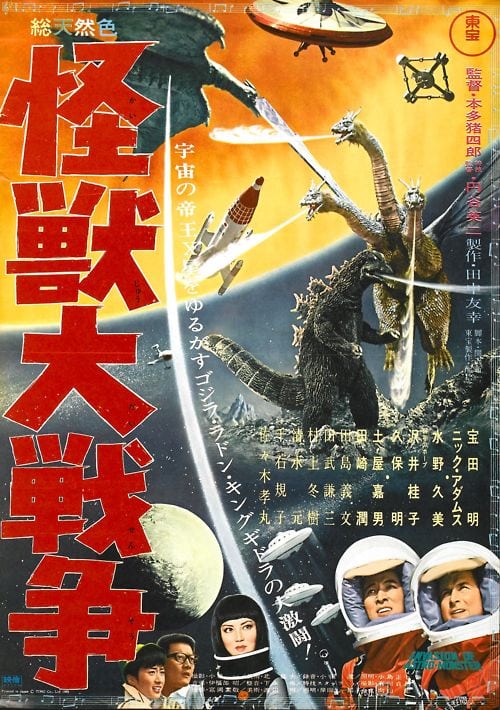
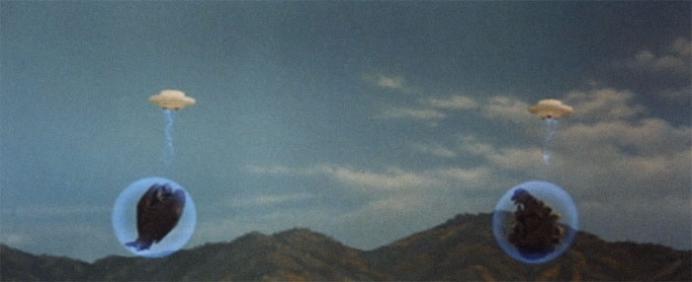
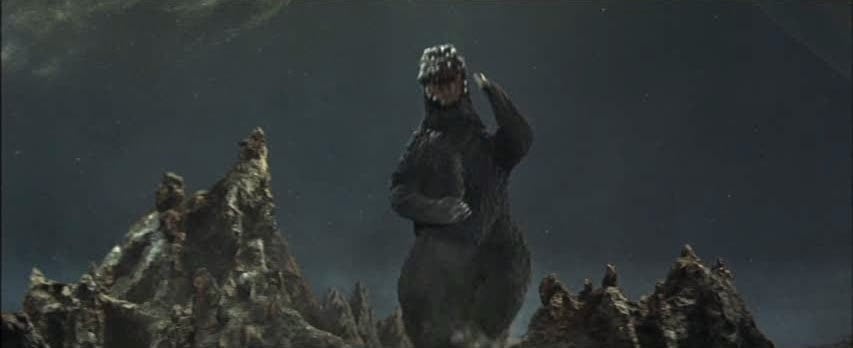



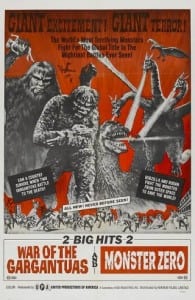


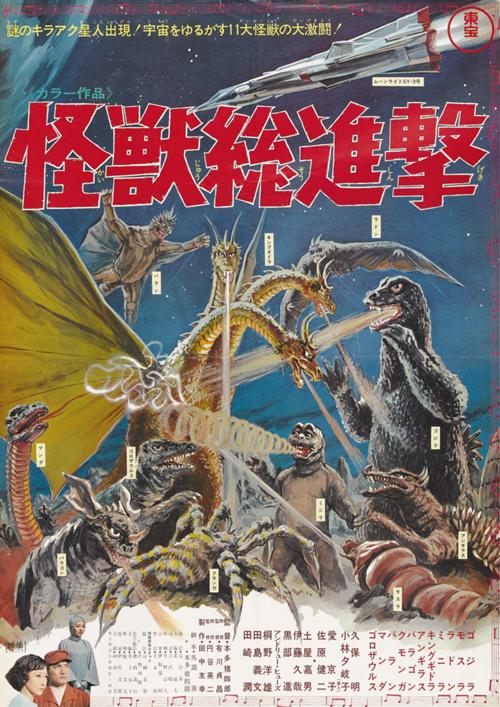
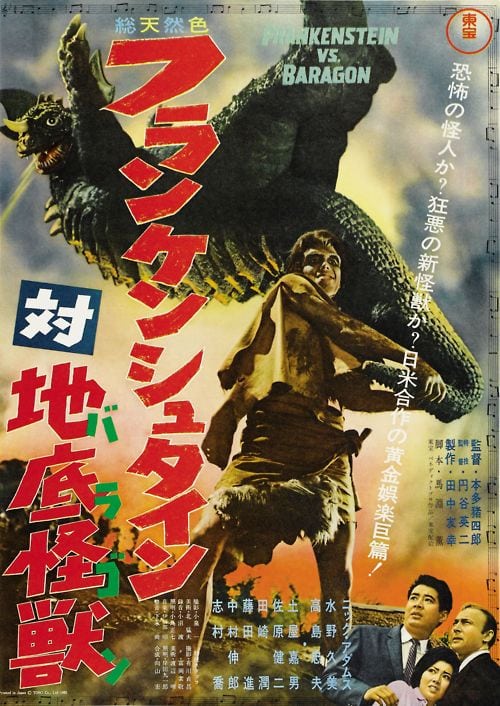
Be the first to comment